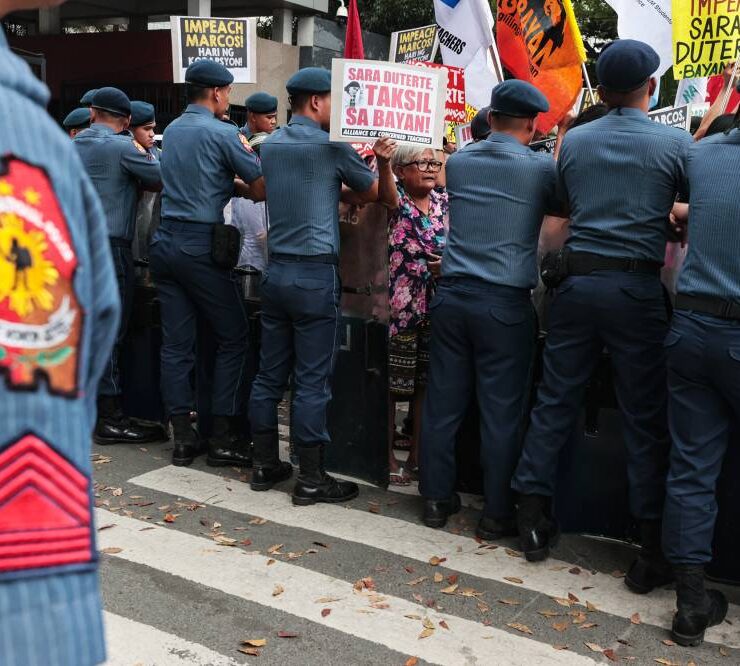US warns Israel vs attacking Iran

JERUSALEM/DUBAI/WASHINGTON—President Joe Biden warned Prime Minister Benjamin Netanyahu to “think carefully” about retaliating after Iran’s massive drone and missile attack on Saturday, saying the US would not take part in any Israeli counter-offensive.
Netanyahu’s war Cabinet favors striking back at Iran after a mass drone and missile attack on Israeli territory, according to officials.
The threat of open warfare erupting between the arch Middle East foes and dragging in the United States has put the region on edge, triggering calls for restraint from global powers and Arab nations to avoid further escalation.
Israel and Iran accused one another at the United Nations on Sunday of being the main threat to peace in the Middle East, each calling on the Security Council to impose sanctions on their sworn enemy.
The White House said Biden did not want a wider war after helping key ally Israel repel a massive aerial attack by Tehran—itself in retaliation for a presumed Israeli strike that killed an Iranian general in Damascus.
“We’re not looking for a wider war with Iran,” White House National Security Council spokesperson John Kirby said on NBC’s “Meet the Press,” adding that the United States does not “want to see this escalate.”
Kirby said Netanyahu was “well aware” of Biden’s feelings after the two leaders spoke on Saturday while Iran’s unprecedented attack was still unfolding.
A senior Biden administration official confirmed that Biden told Netanyahu that Washington would not offer military support for any retaliation on Iran.
“We would not be a part of any response they do,” the official told reporters on a call, speaking on condition of anonymity. “We would not envision ourselves participating in such an act.”
‘Slow things down’
Biden and Netanyahu spoke at a time of “heightened emotion” while the attacks were still ongoing and “had a discussion about trying to slow things down.”The US president “made very clear to the prime minister last night that we do have to think carefully and strategically about the risks of escalation.”
Israeli officials said Netanyahu’s five-member war Cabinet favored retaliation in a meeting on Sunday, though the panel is divided over the timing and scale of any such response.
Iran launched the attack over a suspected Israeli strike on its embassy compound in Syria on April 1 that killed top Revolutionary Guards commanders and followed months of clashes between Israel and Iran’s regional allies, triggered by the war in Gaza.
However, the attack by more than 300 missiles and drones, mostly launched from inside Iran, caused only modest damage in Israel as most were shot down by Israel’s Iron Dome defense system and with help from the US, Britain, France and Jordan.
An Air Force base in southern Israel was hit but continued to operate as normal and a 7-year-old child was seriously injured by shrapnel. There were no other reports of serious damage.
Two senior Israeli ministers signaled on Sunday that retaliation by Israel was not imminent and that it would not act alone.
At the United Nations, Israel and Iran urged the Security Council to “take action” against the other.
“The mask is off. Iran, the number one global sponsor of terror, has exposed its true face as the destabilizer of the region and the world,” Israel’s UN Ambassador Gilad Erdan told an emergency meeting of the Security Council convened after Tehran’s attack on Israel.
“The mask comes off and the gloves must come on,” he said, imploring the body to “take action.”
Erdan asked the Security Council to designate the Revolutionary Guards, the Islamic Republic’s ideological army, as a terrorist organization and to “impose all possible sanctions on Iran before it’s too late.”
In particular, he referred to the “snapback” mechanism that allows members of the 2015 Iran nuclear deal—which the United States exited in 2018—to reimpose international sanctions against Tehran.
Security Council ‘failed’
Addressing the emergency meeting, Iran’s UN Ambassador Amir Saeid Iravani insisted the Islamic republic was exercising its “inherent right to self-defense.”
“The Security Council…failed in its duty to maintain international peace and security,” Iravani said.
Therefore, Tehran “had no choice” but to respond, he said, adding that his country does “not seek escalation or war,” but will respond to any “threat or aggression.”
He also lashed out at Israel.
“It is time for the Security Council to shoulder its responsibility and address the real threat to international peace and security,” Iravani said.
The body “must take urgent and punitive measures to compel this regime to stop a genocide against the people of Gaza.”
In the meantime, Israel remained on high alert with emergency measures expected to remain in place until late on Monday, including a ban on school activities and caps on large gatherings.
“Over the last few hours, we approved operational plans for both offensive and defensive action,” Rear Admiral Daniel Hagari said in a televised statement.
Drone and missile interceptions cost around 4.5 billion shekels ($1.2 billion), according to Israel’s Channel 13 News, which said some of the cost was funded by the US.
Iranian army chief of staff Major General Mohammad Bagheri said on television, “Our response will be much larger than tonight’s military action if Israel retaliates against Iran,” and told Washington that its bases could also be attacked if it helped Israel retaliate.
Iranian Foreign Minister Hossein Amirabdollahian said Tehran had informed the United States its attack on Israel would be limited and for self-defense and that regional neighbors had been informed of its planned strikes 72 hours in advance. —reports from REUTERS, AFP




















